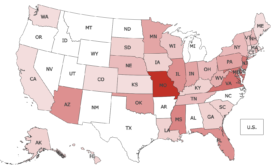 April saw an uptick in legislative activity surrounding public notice issues as many states approached the date they’re scheduled to adjourn. Press groups in Minnesota and Louisiana found themselves in scramble mode as public notice bills they opposed began moving. Although neither situation has been completely resolved, they appear to be headed in the right direction for residents of each state who care about government transparency.
April saw an uptick in legislative activity surrounding public notice issues as many states approached the date they’re scheduled to adjourn. Press groups in Minnesota and Louisiana found themselves in scramble mode as public notice bills they opposed began moving. Although neither situation has been completely resolved, they appear to be headed in the right direction for residents of each state who care about government transparency.
- Minnesota
Indiana adopts digital-newspaper notice
 Indiana Gov. Eric Holcomb signed three bills last month that will impact the state’s public notice laws. When it takes effect on July 1, the most significant bill will make Indiana the first state to authorize government units to publish primary notice on some newspaper websites or e-editions.
Indiana Gov. Eric Holcomb signed three bills last month that will impact the state’s public notice laws. When it takes effect on July 1, the most significant bill will make Indiana the first state to authorize government units to publish primary notice on some newspaper websites or e-editions.
House Bill 1204, which passed both the House and Senate unanimously, allows local governments and state agencies to circumvent the print editions of most newspapers by posting notices in one of their digital products as an alternative. However, the bill only applies to newspapers that distribute fewer than four editions per week; print will remain the exclusive means for government notice in papers that are published more frequently.
Get to know your political representatives!
 One of the most important factors in maintaining newspaper notice is the strength of the relationships between local publishers and their representatives in the state legislature. The relationships don’t need to be particularly close. They don’t even need to be politically harmonious as long as there is a baseline of trust. Public officials who can put a face to their local paper are much more likely to consider its policy concerns.
One of the most important factors in maintaining newspaper notice is the strength of the relationships between local publishers and their representatives in the state legislature. The relationships don’t need to be particularly close. They don’t even need to be politically harmonious as long as there is a baseline of trust. Public officials who can put a face to their local paper are much more likely to consider its policy concerns.
February brings more evidence of shift to newspaper websites
 Last month provided additional confirmation that state legislatures are increasingly looking to newspaper websites rather than government sites to supplement and perhaps eventually serve as an alternative to printed newspapers as the primary medium for public notice. Bills illustrating that trend moved closer to becoming law in both Indiana and Iowa.
Last month provided additional confirmation that state legislatures are increasingly looking to newspaper websites rather than government sites to supplement and perhaps eventually serve as an alternative to printed newspapers as the primary medium for public notice. Bills illustrating that trend moved closer to becoming law in both Indiana and Iowa.
Indiana
The tenor of public notice legislation has shifted in Indiana. At the start of 2023 it was one of the two or three states that seemed most likely to abandon newspapers in favor of government websites. Yesterday the legislature approved a bill that could instead serve as a gateway to an eventual migration to newspaper websites.
Stop disparaging public notice advertising!
 Pay close attention to reporting on public notice issues and you may begin to observe that some papers have adopted certain rhetorical habits that tend to undermine the goal of preserving newspaper notice. They’re mostly innocent mistakes made by people who are unaware that what they’re doing may be counterproductive. But it’s fair to say that if those habits could be eliminated it might enhance the policy environment for maintaining newspaper notice.
Pay close attention to reporting on public notice issues and you may begin to observe that some papers have adopted certain rhetorical habits that tend to undermine the goal of preserving newspaper notice. They’re mostly innocent mistakes made by people who are unaware that what they’re doing may be counterproductive. But it’s fair to say that if those habits could be eliminated it might enhance the policy environment for maintaining newspaper notice.
News websites supplanting government sites as alternative source of notice?
 Public notice legislation introduced so far in 2024 suggests state legislatures are growing increasingly comfortable having news websites serve as an alternative source of official notice. And that comfort seems to have cooled their ardor for moving notices from newspapers to government websites.
Public notice legislation introduced so far in 2024 suggests state legislatures are growing increasingly comfortable having news websites serve as an alternative source of official notice. And that comfort seems to have cooled their ardor for moving notices from newspapers to government websites.
As of the end of last week, new legislation authorizing local news websites or newspaper websites to provide statutory notice in lieu of print had been introduced in at least six states, while bills sanctioning the move from print newspapers to government websites had been introduced in only two states — and one of them is already dead.
N.Y. paper sues county over pulled notices
 A newspaper based in Delaware County, N.Y. sued county officials in December, claiming they unlawfully canceled its public notice contract in retaliation for unfavorable news coverage. The Reporter, a weekly newspaper based in the county seat of Delhi, also alleges the county violated the First and Fourteenth Amendments by ordering its employees to refer all questions from the paper to the county attorney’s office.
A newspaper based in Delaware County, N.Y. sued county officials in December, claiming they unlawfully canceled its public notice contract in retaliation for unfavorable news coverage. The Reporter, a weekly newspaper based in the county seat of Delhi, also alleges the county violated the First and Fourteenth Amendments by ordering its employees to refer all questions from the paper to the county attorney’s office.
The lawsuit was filed in federal court by Decker Advertising, the agency that owns The Reporter.
Public notice year in review
 2023 was a lot like 2022: A pretty good year marred primarily by the vote of a GOP-dominated state legislature to allow some local governments to publish notice on their own websites in lieu of local newspapers. Last year it was Florida, this year Ohio.
2023 was a lot like 2022: A pretty good year marred primarily by the vote of a GOP-dominated state legislature to allow some local governments to publish notice on their own websites in lieu of local newspapers. Last year it was Florida, this year Ohio.
Twenty-one states saw bills in 2023 that would have significantly curtailed newspaper notice, a number that is at the high end of the normal range for these kinds of bills. The only one to pass was Ohio HB-33.
Report shows limits of government publishing capacity
![]() Almost 40 percent of the counties, cities, villages, and towns in Wisconsin don’t post their local ordinances on a website or, at best, have posted an “obviously incomplete listing of ordinances,” according to a report issued late this summer by the state’s Department of Administration (DOA).
Almost 40 percent of the counties, cities, villages, and towns in Wisconsin don’t post their local ordinances on a website or, at best, have posted an “obviously incomplete listing of ordinances,” according to a report issued late this summer by the state’s Department of Administration (DOA).
The agency also noted that many local governments that do post their ordinances on the web make it difficult or impossible to find them or to determine how comprehensive they are.
Move to government websites picks up steam in Ohio
 Townships in Ohio are seeking the same power already granted to municipalities in the state: The power to publish notice via the Internet instead of a local newspaper.
Townships in Ohio are seeking the same power already granted to municipalities in the state: The power to publish notice via the Internet instead of a local newspaper.
Introduced late last week, a new bill, HB-315, would expand townships’ public notice options beyond print, allowing them to post notice on their own websites and social media accounts, or on the Ohio News Media Association’s statewide public notice site. It adopts the same language as HB-33, legislation enacted this summer authorizing cities and villages — “municipalities” under Ohio law — to publish notice online. HB-315 duplicates HB-33’s statewide website option even though ONMA announced after the latter bill passed that without major upgrades the website isn’t capable of accepting ads directly from customers.
